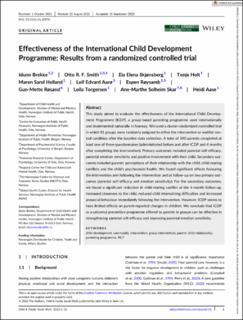| dc.contributor.author | Brekke, Idunn | |
| dc.contributor.author | Smith, Otto Robert Frans | |
| dc.contributor.author | Skjønsberg, Eia Elena | |
| dc.contributor.author | Holt, Tonje | |
| dc.contributor.author | Helland, Maren Sand | |
| dc.contributor.author | Aarø, Leif Edvard | |
| dc.contributor.author | Røysamb, Espen | |
| dc.contributor.author | Røsand, Gun-Mette Brandsnes | |
| dc.contributor.author | Torgersen, Leila | |
| dc.contributor.author | Skar, Ane-Marthe Solheim | |
| dc.contributor.author | Aase, Heidi | |
| dc.date.accessioned | 2022-11-18T09:57:32Z | |
| dc.date.available | 2022-11-18T09:57:32Z | |
| dc.date.created | 2022-10-17T12:45:54Z | |
| dc.date.issued | 2022 | |
| dc.identifier.issn | 1356-7500 | |
| dc.identifier.uri | https://hdl.handle.net/11250/3032800 | |
| dc.description.abstract | This study aimed to evaluate the effectiveness of the International Child Development Programme (ICDP), a group-based parenting programme used internationally and implemented nationally in Norway. We used a cluster randomized controlled trial in which 81 groups were randomly assigned to either the intervention or waitlist control condition after the baseline data collection. A total of 590 parents completed at least one of three questionnaires (administrated before and after ICDP and 4 months after completing the intervention). Primary outcomes included parental self-efficacy, parental emotion sensitivity and positive involvement with their child. Secondary outcomes included parents' perceptions of their relationship with the child, child-rearing conflicts and the child's psychosocial health. We found significant effects favouring the intervention arm following the intervention and at follow-up on two primary outcomes (parental self-efficacy and emotion sensitivity). For the secondary outcomes, we found a significant reduction in child-rearing conflict at the 4-month follow-up, increased closeness to the child, reduced child internalizing difficulties and increased prosocial behaviour immediately following the intervention. However, ICDP seems to have limited effects on parent-reported changes in children. We conclude that ICDP as a universal preventive programme offered to parents in groups can be effective in strengthening parental self-efficacy and improving parental emotion sensitivity. | en_US |
| dc.language.iso | eng | en_US |
| dc.publisher | Wiley | en_US |
| dc.rights | Navngivelse 4.0 Internasjonal | * |
| dc.rights.uri | http://creativecommons.org/licenses/by/4.0/deed.no | * |
| dc.title | Effectiveness of the International Child Development Programme: Results from a randomized controlled trial | en_US |
| dc.type | Journal article | en_US |
| dc.type | Peer reviewed | en_US |
| dc.description.version | publishedVersion | en_US |
| dc.rights.holder | Copyright 2022 The Author(s) | en_US |
| cristin.ispublished | true | |
| cristin.fulltext | original | |
| cristin.qualitycode | 2 | |
| dc.identifier.doi | 10.1111/cfs.12973 | |
| dc.identifier.cristin | 2061981 | |
| dc.source.journal | Child & Family Social Work | en_US |
| dc.identifier.citation | Child & Family Social Work. 2022. | en_US |

